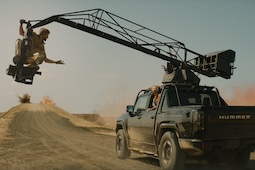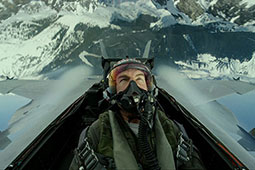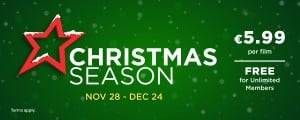
We're counting down to the release of Tenet by looking back at Christopher Nolan's movies in order.
The director's latest project is a typically secretive affair, dealing in armageddon, time inversion and much more besides. John David Washington and Robert Pattinson lead an all-star cast including Kenneth Branagh and Michael Caine.
This week, we're examining Nolan's third feature film, Insomnia.
What is the story of Insomnia?
Veteran LAPD detective Will Dormer is haunted by the time that he shot his partner in the line of duty. To all intents and purposes, the shooting was an accident, but Dormer's mental state becomes increasingly unbalanced as he's plagued by guilt.
He and his partner are dispatched to the distant town of Nightmute in Alaska, where the sun always shines. They're in town to investigate the murder of a young girl, assisted by local detective Ellie Burr (Hilary Swank), who is a self-confessed fan of Dormer's investigative approach.
Suspicion soon rests on softly spoken local writer Walter Finch (Robin Williams), who soon embroils Dormer in a deadly cat and mouse game. With sleep not an option and Finch seemingly watching his every move, Dormer begins to crack under the pressure.
How was Insomnia made?
Fresh from the critical success of his non-linear drama Memento, director Christopher Nolan was earmarked as an exciting young film director. Adapted from his brother Jonathan Nolan's story 'Memento Mori', Memento showcased a truly audacious structure that required active engagement from the audience. With two narratives unspooling in different directions, one backwards, the other forwards, it's little wonder the film's intricacy and psychological sophistication saw it Oscar-nominated for Best Adapted Screenplay.
The plaudits given to Memento raised Nolan's profile even further, leading him onto Insomnia. Nolan decided to adapt a brooding 1997 Norwegian film in which a tormented police detective has his guilty secrets exposed by the key suspect in a murder investigation. Whereas in recent years, Hollywood remakes of idiosyncratic Scandi properties have received mixed reviews (see David Fincher's remake of The Girl With the Dragon Tattoo), Nolan's directorial personality was strong enough to invest Insomnia with fresh purpose.
The essential storyline of Insomnia plays directly to Nolan's strengths. At its centre is a protagonist, Al Pacino's Will Dormer, who straddles the line between good and evil, which is something that would later haunt Christian Bale's Batman in the Dark Knight trilogy. There's a seductive and absorbing villain, Robin Williams' Walter Finch, who, frighteningly, often talks sense and appears to know the hero better than he knows himself. The film exists in a washed-out world of guilt and recrimination, not unlike later Nolan movies like The Prestige. And, like all of Nolan's films, it's pre-occupied, or, more accurately, obsessed with the notion of memory and time.
This comes back to haunt Pacino's character Dormer when he holes up in the Alaskan town of Nightmute to begin his murder investigation. The very elements seem to conspire against him: perpetual sunlight that keeps him awake, and drags his guilty demons into the spotlight. Dormer's relentless need to block out the light carries a level of frenzied psychological urgency, the sort that underpins most of Nolan's characters. Just think, for example, of Leonardo DiCaprio's Dominic Cobb in Inception, whose very subconscious is haunted by the spectre of his late wife Mal (Marion Cotillard).
Although Insomnia is, by Nolan's standards, a conventionally plotted thriller, it more than makes up for it with buckets of gloomy atmosphere. Nolan's regular cinematographer Wally Pfister lenses the Alaskan landscape in shades of steely grey and blue, while also picking out memorable physical details. One chase scene over a series of logs floating downstream turns into a memorably claustrophobic, underwater battle for survival, aided by David Julyan's spare, haunting score.
The film was shot over the course of three months at a variety of locations across Alaska. The expert use of the landscape instills a frigid sense of menace and melancholy despair, aided by a suitably weathered Al Pacino performance. Nolan would say in a later interview that "[Pacino] would produce a peak of energy and shift it, take to take... because he would reach something very extreme, then, 30 seconds later, reach exactly the right note." Nolan added: "It was a joy to work with him, and I learned a tremendous amount doing it."
Although Hilary Swank is perhaps underused as the idolising police officer Ellie Burr, Insomnia does feature a Robin Williams performance for the ages. The late, revered comic actor had carved out numerous dramatic performances prior to this film, famously in the likes of Good Morning Vietnam, Dead Poets Society, The Fisher King and Good Will Hunting, for which he won an Oscar. But the chance to see Williams in his first proper villainous role jolts the entire movie like electricity: the very sense that Williams is containing his energetic persona feeds perfectly into the character of Finch, whose outward affability clearly conceals raging inner malice.
In the wake of Williams' death in 2014, Nolan praised the actor, lauding his performance as "very, very precise … very truthful to the darker side of human nature". Nolan added: "Robin was an incredible talent, and perhaps undervalued as a dramatic actor because his incredible gift for comedy overshadowed it."
Although Williams expressed enthusiasm for appearing as The Riddler in a Nolan Batman movie ("I'm a bit too hairy for tights," he quipped), sadly, they never got to work together again. Interestingly, the same year that Insomnia was release, Williams delivered another chilling and brilliant performance in One Hour Photo as a lonely photograph developer who fixates on one particular family.
However it was Nolan who got there first, who recognised that elusive "truthful" quality referred to in the above interview. It was a sign of Nolan's brilliance with actors, which when coupled with his assured sense of atmosphere, storytelling and suspense, helped propel Insomnia to huge success. This would be a critical turning point in Nolan's career, as he later pivoted from mid-budget thrillers into escalatingly ambitious and thematically complex tentpole movies.
How was Insomnia received?
Insomnia was another critical hit for Nolan, although it didn't receive the Oscar recognition that the earlier Memento did. Reviewers praised the film's brooding atmosphere and psychological insight, while pinpointing it as a rare remake of value, one that could stand proud alongside the original movie.
Lou Lumenick of the New York Post called the movie a "four-course gourmet alternative to summer popcorn flicks, serving up the meatiest performances Al Pacino and Robin Williams have given in many years".
Even more impressively, the director of the original Insomnia, Erik Skjoldbjærg, lauded Nolan's approach: "Well I haven't seen it for quite a while, but when I first saw it it was a very strange experience because it was quite close, stylistically, to the original. I felt lucky that it's such a well crafted, smart film and that it had a really good director handling it, because as a remake I think it did really well and it doesn't hurt any original if a remake is well done. So I felt I was lucky that Christopher Nolan took it upon himself to do it."
Critical acclaim was matched by box office success: Insomnia grossed $113 million worldwide against a $46 million budget. The film's success would cement Nolan's partnership with studio Warner Bros, while also foreshadowing the rare mixture of critical kudos and commercial success of his later, bigger-budget films.
What was the next Christopher Nolan movie?
Batman Begins, starring Christian Bale as the Dark Knight, was Nolan's next movie.
Tenet is scheduled for release on 26th August 2020. What is your favourite Christopher Nolan movie? Let us know @Cineworld.















.jpg)
.png)



